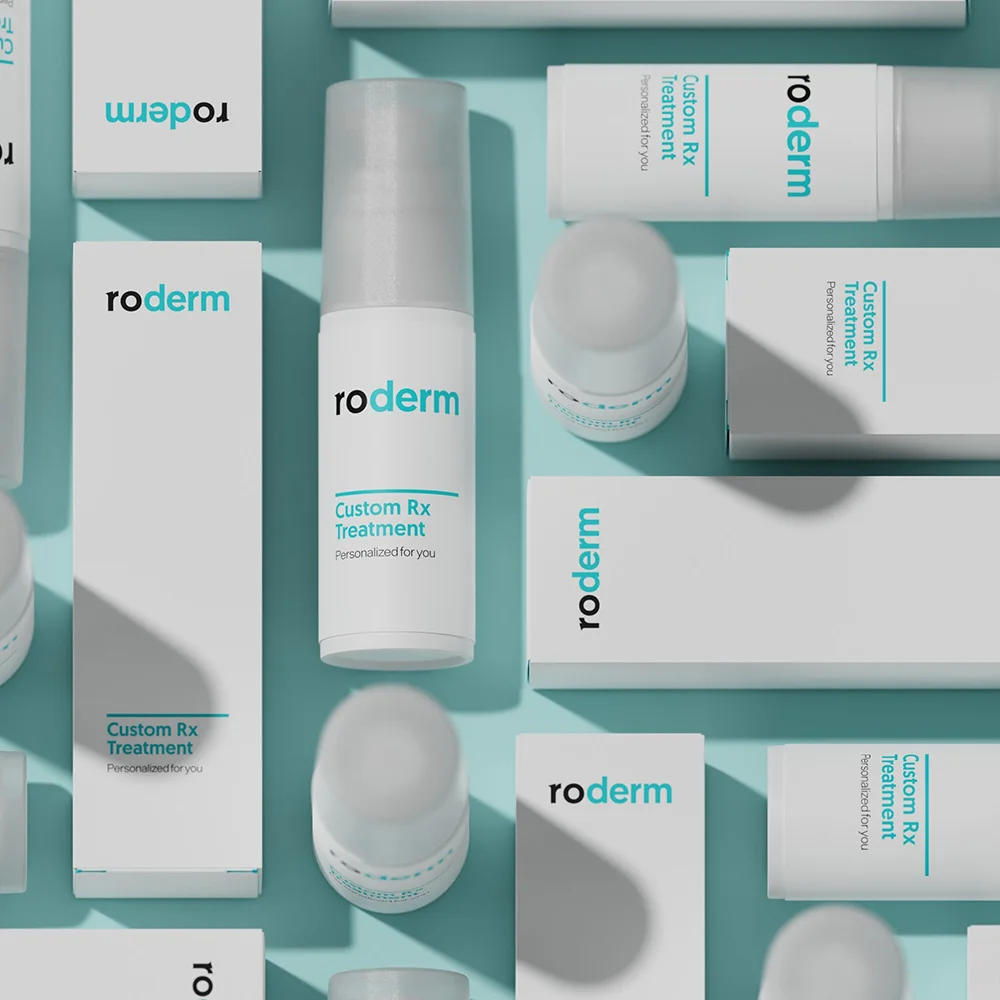Here's what we'll cover
Here's what we'll cover
Your eyelids have the thinnest skin on your body. Because it’s so thin, the skin is super sensitive and can easily become inflamed and irritated (Papier, 2007).
Eyelid eczema can be uncomfortable, and some people may be embarrassed by how it looks. Fortunately, most people get better with treatment or by avoiding whatever triggered the flare-up to begin with. Here’s what you need to know about eyelid eczema, what causes it, and how to treat it.
What is eyelid eczema and how does it start?
Eczema, also called dermatitis, refers to a family of skin conditions that irritate and inflame the skin. Common symptoms of this condition include:
Redness
Itching
Irritation
Dry, scaly skin
Burning or stinging
Swelling (edema)
Some risk factors may make people more likely to develop eyelid dermatitis, including (Feser, 2008):
Women
Age over 40
History of atopic eczema, asthma, or hay fever
Causes of eyelid eczema
Allergens, irritants, and underlying skin conditions can all lead to eyelid eczema. Studies show that allergic contact dermatitis (ACD) causes anywhere from 46–72% of eyelid eczema cases (Guin, 2002). Other causes include atopic dermatitis (14–39.5% of people with eyelid eczema) and irritant contact dermatitis (up to 17%) (Guin, 2002).
Allergic contact dermatitis (ACD)
ACD is the most common cause of eyelid eczema (Feser, 2010). Allergic contact dermatitis is an immune response to an allergen that your body doesn’t like. Essentially, your immune system identifies the substance as foreign and attacks it, causing damage to your skin and tissues. It may take time to develop an allergy; for instance, you may suddenly become allergic to a shampoo or cosmetic product that you’ve been using for months. Since the eyelid skin is very thin, many people find that they experience allergic symptoms on their eyelids, but not necessarily elsewhere (Landeck, 2010). For example, you can develop eyelid eczema as a reaction to a shampoo or other hair care product and not have any symptoms elsewhere. The most common allergens (things that cause allergic reactions) in allergic contact dermatitis of the eyelids include:
Metals (e.g., nickel, gold), which can be found in cosmetics or make-up brushes
Fragrances
Certain preservatives, like those in some cosmetics or eye drops
Antibiotic creams, like gentamicin and neomycin
Nail polish, especially those with acrylates
Cosmetics
One study found that the products most likely to lead to eyelid contact dermatitis included face cream, eye shadow, make-up, mascara, superglue, and nail polish (Feser, 2008).
You can also develop ACD in response to airborne allergens, especially from allergens like pollen from ragweed and similar plants, dust mites, and animal dander. Aerosolized particles from things like plastics, rubber, glues, pesticides, household cleaners, etc., can also lead to eyelid eczema (Reeder, 2019).
People with allergic contact dermatitis often complain of itching as one of the most prominent symptoms; you may develop dryness, thick skin, and scaling from scratching. If you have a reaction around both eyes, research has found that it’s more likely to be the result of allergic contact dermatitis than the other causes (Ayala, 2003).
Irritant contact dermatitis
Unlike allergic contact dermatitis, where the inflammation results from your immune system causing damage to your tissues, irritant contact dermatitis (ICD) is a direct toxic effect of the irritant itself to your sensitive eyelid skin (Papier, 2007). While ICD is most commonly found on peoples’ hands (due to chemical exposure from work or cleaning materials), about one in six cases of eyelid eczema is the result of ICD (Guin, 2002). The most common offenders are soaps, preservatives, cosmetics, and fragrances. Metals like nickel and cobalt can also cause ICD (Ayala, 2003). Anti-aging products, like topical retinoids and retinoid derivatives, are a frequent culprit—they can cause eyelid eczema even if they are not being applied directly to the eyelid.
Atopic dermatitis
Atopic dermatitis (AD) is a common skin condition that usually affects children and teenagers. Atopic dermatitis can appear on the cheeks, scalp, forehead, and other parts of the face, including the eyelids. In addition to eyelid eczema symptoms, people with atopic dermatitis of the eyelids are more likely to have lichenification (thick, leathery skin) and scaling of their eyelid skin (AAD-a, n.d.).
Some people with a history of childhood atopic dermatitis may develop symptoms on their eyelids in adulthood, such as dry, scaly, itchy patches of skin around the eyes. For others, eyelid eczema may be the only atopic dermatitis they develop. Atopic dermatitis can occur along with or be triggered by irritants or contact eyelid dermatitis. While most people with eyelid eczema don’t have eye problems, those with atopic dermatitis may develop conditions in their eyes including conjunctivitis, corneal inflammation (keratitis), or changes in the shape of the cornea (keratoconus).
Scientists don’t know the exact cause of atopic dermatitis, but it is likely a combination of your environment, your genes, and how your immune system works.
How is eyelid eczema diagnosed?
The appearance of redness, swelling, itching, irritation, etc., around the eyes is easily recognizable. However, it can be challenging to determine the cause of eyelid eczema.
Speaking with a general healthcare provider or ophthalmologist (eye doctor) can help you determine what’s causing your eyelid eczema. Think about your skincare routines and make-up choices and look at the ingredients, especially if you have recently started any new products. Don’t forget about things you put on your hands or substances you may be exposed to at work—these can also contribute to eyelid eczema. Lastly, let your provider know if you are using any eye drops, either prescription or over-the-counter.
Your provider may recommend that you get patch testing to look for allergic contact dermatitis; a dermatologist or allergist may perform this testing. During a patch test, your provider applies small amounts of common antigens to the skin on your back and then covers each allergen with a patch. The patches are left on for 48 hours to see if your skin reacts to any of the allergens. After the time has passed, your provider removes the patches and looks to see if you develop skin reactions or rashes to any allergens. Then you see your provider again after 4–7 days to check for any delayed allergic skin reactions.
Other conditions that can look like eyelid eczema include (Papier, 2007) :
Blepharitis: Inflammation of the eyelid margins near the lashes
Periorbital cellulitis: Skin infection around the eyes
Psoriasis: A skin condition that causes scaly plaques
Ocular rosacea: A common chronic skin problem
Herpes zoster (shingles) infection: A viral infection
Treatment for eyelid eczema
One of the best things that you can do for eyelid eczema is to avoid the triggering agent. Look for common allergens in your personal care, cosmetic, and hair products. The most commonly reported allergens found on patch testing are gold, fragrances, Balsam of Peru (a resin used in flavoring and fragrances), nickel, and neomycin (an antibiotic) (Chisholm, 2017). Avoid fragrances or other irritants whenever possible, and use gentle cleansers and moisturizers on your face.
Steroids applied directly to the eyelids (topical corticosteroids) can help improve your symptoms when used for a short time. However, topical corticosteroids should not be used for more than a few weeks. Prolonged use of these medications can cause skin thinning (atrophy) and an increase in the pressure inside your eye (glaucoma).
Alternatively, if you need long-term treatment for your symptoms, topical calcineurin inhibitors are preferred over corticosteroids. Topical calcineurin inhibitors (TCIs), like pimecrolimus and tacrolimus, are safe to use in the eye area. They work by dampening your immune system’s response in the area where they’re applied—which can help alleviate the symptoms of eyelid eczema.
Eyelid eczema can be uncomfortable, embarrassing, and frustrating, especially if you can’t identify the specific allergen or trigger. Fortunately, it is treatable and most people do well in the long run—many people recover within a month of treatment (Chisholm, 2017). Talk to your healthcare provider if you are concerned about eyelid eczema; together, you will develop a treatment plan.
DISCLAIMER
If you have any medical questions or concerns, please talk to your healthcare provider. The articles on Health Guide are underpinned by peer-reviewed research and information drawn from medical societies and governmental agencies. However, they are not a substitute for professional medical advice, diagnosis, or treatment.
American Academy of Dermatology (n.d.-a). Eczema types: Atopic Dermatitis Overview. Retrieved on 21 January 2021 from https://www.aad.org/public/diseases/eczema/types/atopic-dermatitis.
American Academy of Dermatology (n.d-b). Patch Testing Can Find What's Causing Your Rash. Retrieved on 21 January 2021 from https://www.aad.org/public/diseases/eczema/types/contact-dermatitis/patch-testing-rash.
Ayala, F., Fabbrocini, G., Bacchilega, R., Berardesca, E., Caraffini, et al. & Gruppo Italiano di Ricerca sulle Dermatiti da Contatto e Ambientali della Società Italiana di Dermatologia e Venereologia (2003). Eyelid dermatitis: an evaluation of 447 patients. American Journal of Contact Dermatitis : Official Journal of the American Contact Dermatitis Society, 14 (2), 69–74. Retrieved from https://pubmed.ncbi.nlm.nih.gov/14749023/.
Chisholm, S.A.M., Couch, S.M, Custer, P.L. (2017). Etiology and Management of Allergic Eyelid Dermatitis. Ophthalmic Plastic and Reconstructive Surgery, 33 (4), 248-250. Retrieved from https://pubmed.ncbi.nlm.nih.gov/27333449/ .
Feser, A., Plaza, T., Vogelgsang, L., & Mahler, V. (2008). Periorbital dermatitis--a recalcitrant disease: causes and differential diagnoses. The British Journal of Dermatology, 159 (4), 858–863. Retrieved from https://pubmed.ncbi.nlm.nih.gov/18721191/.
Feser, A., & Mahler, V. (2010). Periorbital dermatitis: causes, differential diagnoses and therapy. Journal der Deutschen Dermatologischen Gesellschaft = Journal of the German Society of Dermatology : JDDG, 8 (3), 159–166. Retrieved from https://pubmed.ncbi.nlm.nih.gov/19751221/
Guin J. D. (2002). Eyelid dermatitis: experience in 203 cases. Journal of the American Academy of Dermatology, 47 (5), 755–765. Retrieved from https://pubmed.ncbi.nlm.nih.gov/12399770/.
Landeck, L., Schalock, P. C., Baden, L. A., & Gonzalez, E. (2010). Periorbital contact sensitization. American Journal of Ophthalmology, 150 (3), 366–370.e2. Retrieved from https://pubmed.ncbi.nlm.nih.gov/20541737/.
Papier, A., Tuttle, D. J., & Mahar, T. J. (2007). Differential diagnosis of the swollen red eyelid. American Family Physician, 76 (12), 1815–1824. Retrieved from https://www.aafp.org/afp/2007/1215/p1815.html.










